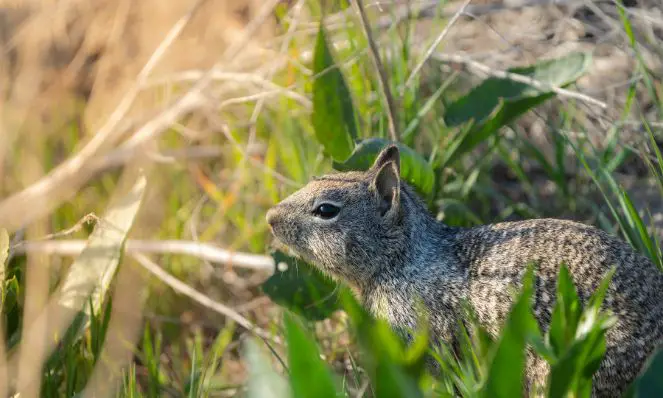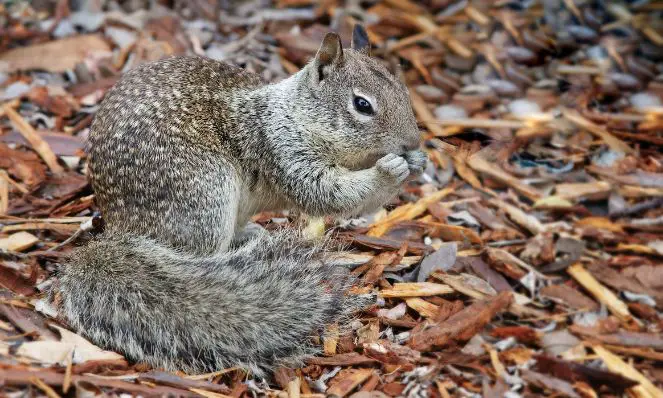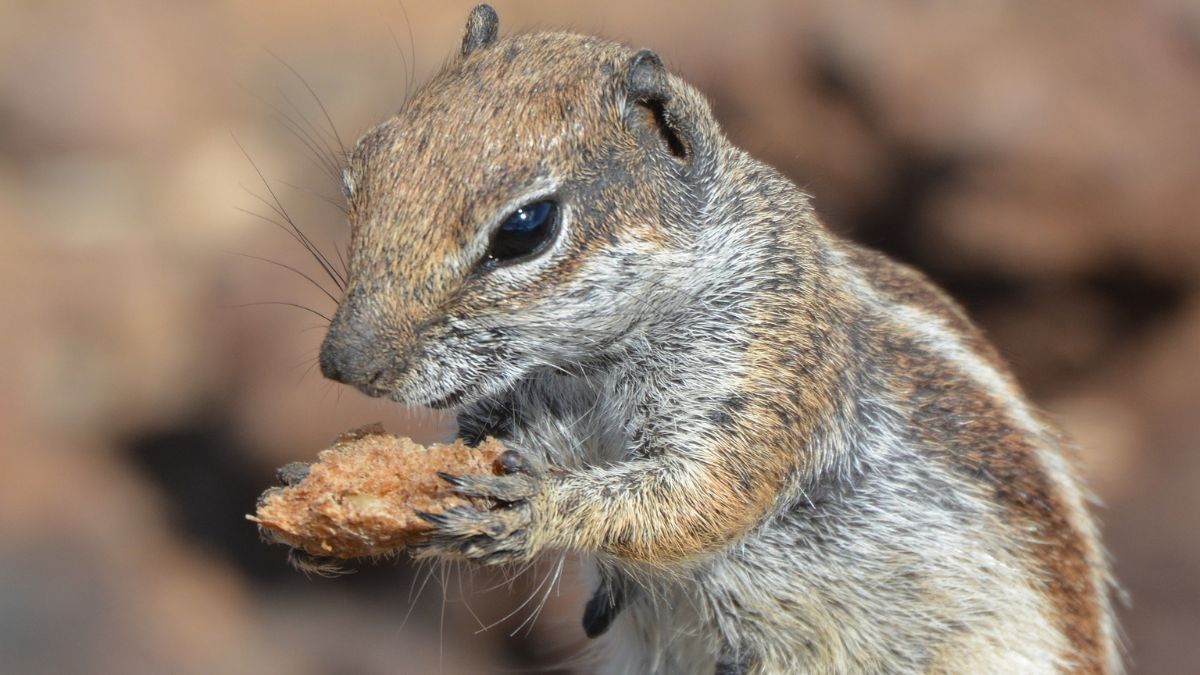Ground squirrels may seem harmless and cute, but they can wreak havoc on your property.
These rodents can be a nuisance, from damaging gardens to burrowing under foundations.
If you’re dealing with a ground squirrel infestation, you’re probably wondering how to eliminate them effectively.
In this comprehensive guide, we will explore how to get rid of ground squirrels naturally, including natural deterrents, prevention techniques, and professional extermination options!
What are Ground Squirrels?

Ground squirrels are fascinating rodents found in various North America, Europe, and Asia regions. Unlike their tree-dwelling cousins, they are terrestrial creatures, preferring to live and forage on the ground, especially in areas with loose soil.
With a stout body, bushy tail, and short legs, they display a range of colors, including brown, gray, and tan, with distinctive markings such as stripes or spots.
These social animals live in colonies and create intricate burrow systems as their homes. Ground squirrels have a primarily vegetarian diet, feeding on vegetation, seeds, nuts, fruits, and occasionally insects.
During the colder months, many species undergo hibernation to conserve energy, relying on accumulated fat reserves to sustain them.
While ground squirrels play a vital role in their ecosystems by dispersing seeds and serving as prey for various predators, they can also become frustrating for many homeowners.
Their burrowing habits can damage lawns, gardens, and agricultural fields, causing potential hazards and costly repairs.
Additionally, their fondness for certain crops can lead to significant crop loss, posing challenges to farmers and gardeners alike.
How to Identify Ground Squirrels

Identifying ground squirrels can be tricky, as they are often confused with other types of squirrels or rodents.
Ground squirrels generally have a rounder body shape and shorter tails than tree squirrels, measuring around 7 to 12 inches in length.
Ground squirrels have non-bushy tails and streamlined bodies. Their fur can vary in color, ranging from brown and gray to tan or rust.
They also have unique fur patterns, with spots or stripes running along their backs.
Observing their behavior can also help with identification, as ground squirrels spend most of their time on the ground and are most active during the day.
Damage Ground Squirrels Cause
The damage caused by ground squirrels can be extensive and costly. Their burrowing activities can undermine the structural integrity of buildings, decks, and other structures.
They also threaten plants and crops, often feeding on seeds, bulbs, and young plants.
Ground squirrels can even chew through irrigation lines and electrical wires, leading to costly repairs.
Signs and Causes of a Ground Squirrel Infestation
Identifying the signs of a ground squirrel infestation early on is essential to prevent further damage to your property.
Some common ground squirrel infestation signs include:
- Burrow holes in your yard or garden
- Damaged plants, trees, or structures
- Mounds of dirt near burrow entrances
- Uneven ground or divots in your lawn
- Dead patches of grass or damaged vegetation
- Feces in and around your property
Ground squirrels are attracted to environments with accessible food sources, water, and shelter.
Factors that can contribute to a ground squirrel infestation include:
- Presence of bird feeders or easily accessible food
- Overgrown vegetation or cluttered yards
- Water sources such as ponds or pools
- Unsecured trash or compost bins
How to Trap Ground Squirrels
Ground squirrels can be a pesky nuisance, causing damage to gardens and structures. Trapping is an effective and humane way to remove these critters from your property.
In this section, we’ll walk you through the process of trapping ground squirrels safely and efficiently.
Remember to check regulations for trapping ground squirrels and follow our guidelines for the best results!
Step 1: Choose the Right Trap
Selecting the appropriate trap is crucial for successful ground squirrel trapping. Look for medium-sized live traps designed specifically for squirrels.
These traps are typically made of sturdy metal or wire mesh and have a sensitive trigger mechanism.
Step 2: Determine Trap Placement
Observe ground squirrel activity around your property to identify their favorite spots.
Look for burrow entrances, feeding areas, or places where they frequently scurry about.
Place the traps near these areas, ensuring they are stable and won’t tip over easily.
Step 3: Bait the Trap
Ground squirrels are attracted to nuts, seeds, and fruits. Use these as bait to lure them into the trap.
Peanut butter or sunflower seeds are also effective bait options.
Place a small amount of bait inside the trap and a trail leading up to the entrance to entice the squirrels.
Step 4: Set the Trap
Before setting the trap, ensure the door is propped open, allowing the ground squirrels to acclimate to its presence.
This process is known as “pre-baiting” and increases the chances of a successful capture.
Once the squirrels are comfortable entering the trap to access the bait, set the trap by carefully releasing the door trigger mechanism.
Ensure the door is secure, so it won’t accidentally close before you’re ready.
Step 5: Check the Trap Regularly
Check the traps at least once daily to ensure the ground squirrels don’t remain trapped for extended periods.
Trapped squirrels can become stressed, and releasing them as soon as possible is essential.
Step 6: Relocate the Squirrel(s)
When you’ve successfully trapped a ground squirrel, it’s time to release it safely away from your property.
Choose a location at least five miles away from your home, as squirrels have a homing instinct and may return if released too close.
Step 7: Repeat the Process
Continue setting and monitoring the traps until you’re confident you’ve captured all the ground squirrels in the area.
Keep in mind that there may be multiple individuals, so patience and persistence are essential.
Natural Ground Squirrel Deterrents
Ground squirrels can be persistent pests, but several natural deterrents can help keep them at bay.
- Scent-Based Deterrents: Ground squirrels have a keen sense of smell, and certain scents can discourage them from entering your property. Strong-smelling substances like garlic, peppermint oil, or vinegar can be applied around vulnerable areas to deter them from coming close.
- Plant-Based Deterrents: Some plants are known to repel ground squirrels. For instance, these critters do not favor daffodils, hyacinths, and marigolds and can be strategically planted in your garden to discourage their presence.
- Predator Decoys: Ground squirrels are cautious by nature, and the sight of potential predators can keep them away. Placing fake owls, snakes, or hawk decoys in your yard can create the illusion of danger and deter ground squirrels.
- Noise Repellents: Ground squirrels are sensitive to unexpected sounds. Utilizing wind chimes, radios, or even motion-activated noise devices can startle them and make your property less appealing.
- Motion-Activated Sprinklers: These devices use motion sensors to detect ground squirrels’ movement and then release a burst of water. This sudden spray acts as a deterrent and encourages them to seek alternative areas to forage and nest.
- Pets as Deterrents: If you have dogs or cats, their presence alone can discourage ground squirrels from entering your property. The scent and movements of these larger animals signal potential danger to the smaller rodents.
- Fencing: Installing sturdy wire mesh fencing around your garden can effectively keep ground squirrels out. Opt for fencing with small openings (no larger than 1 inch) to prevent them from squeezing through. Additionally, make sure the fence is at least 2 feet high to deter them from jumping over.
- Mesh Barriers: To protect structures and openings, use mesh screens made of hardware cloth or similar materials. Cover vents, gaps in structures, and any other access points to prevent ground squirrels from entering buildings.
Important Note: When using physical barriers, ensure they are correctly installed and maintained.
Regularly inspect fences and mesh barriers for any damage or gaps that may compromise their effectiveness.
Ground Squirrel Repellent Products
Various commercial repellent products can help discourage ground squirrels from invading your property.
- Natural Repellents: These products usually contain ingredients like predator urine or hot pepper, which deter ground squirrels without causing them harm.
- Electronic Repellents: Devices that emit ultrasonic sounds or vibrations can effectively keep ground squirrels away, but their efficiency may vary.
- Ultrasonic Devices: Emitting high-frequency sound waves, ultrasonic devices create an uncomfortable environment for ground squirrels, encouraging them to leave the area.
Ground Squirrel Prevention Methods
Preventing ground squirrels from establishing a habitat on your property is key to minimizing potential damage.
Here’s how it’s done:
- Securing Waste Management: Ensure that trash cans and compost bins are tightly sealed to eliminate potential food sources for ground squirrels.
- Removing Food Sources: Clean up fallen fruits, nuts, and seeds regularly to deprive ground squirrels of easy access to food.
- Maintaining a Tidy Yard: A well-maintained yard with trimmed vegetation and organized structures is less attractive to ground squirrels seeking shelter.
- Fencing and Barriers: Fencing around vulnerable areas can help keep ground squirrels out. Make sure the fencing extends underground to prevent burrowing.
- Sealing Entry Points: Inspect your home for any openings or gaps that ground squirrels could use to access your attic, basement, or crawl spaces. Seal these openings promptly to prevent their entry.
Ground Squirrel Removal: Dos and Don’ts
When dealing with ground squirrels, following best practices to ensure your safety and these creatures’ well-being is important.
Do’s:
- Do use humane deterrents and traps whenever possible.
- Do consult with professionals for severe infestations or extermination needs.
- Do follow instructions carefully when using any repellent or chemical product.
Don’ts:
- Don’t attempt to harm or kill ground squirrels cruelly.
- Don’t use toxic chemicals or poisons without proper knowledge or supervision.
- Don’t ignore the problem, as ground squirrels can cause significant damage to your property if left unchecked.
Professional Ground Squirrel Removal & Finding the Right Company
If you are overwhelmed by a ground squirrel infestation, it may be time to call in the professionals.
Fortunately, there are many companies that specialize in ground squirrel removal and control.
Here’s what to look for so that you can find the most reputable one!
- Research and Reviews: Start by researching local pest control companies that specialize in rodent removal. Look for customer reviews and testimonials to gain insights into their reputation and the quality of their services.
- Licensing and Certification: Ensure that the company you choose is licensed and certified to handle pest control in your area. This ensures that they follow industry standards and regulations.
- Experience and Expertise: Look for a company with extensive experience in dealing specifically with ground squirrel removal. Experienced technicians are more likely to identify the best strategies for your unique situation.
- Humane Practices: Opt for a company that prioritizes humane methods for ground squirrel removal. Inquire about their approach to ensure they use trapping and relocation techniques that minimize harm to the animals.
- Insurance Coverage: Confirm that the company carries liability insurance to protect you in case of any property damage or accidents during the removal process.
- Written Estimate: Request a written estimate that outlines the scope of work, the services included, and the associated costs. This will help you compare quotes from different companies.
- Guarantee or Warranty: Inquire if the company offers any guarantee or warranty for their services. A reputable company should stand behind their work and offer a satisfaction guarantee.
- Eco-Friendly Solutions: If eco-friendliness is a priority, ask about their use of environmentally safe products and practices to ensure that the ground squirrel removal process aligns with your values.
- Prompt Response and Communication: Pay attention to how quickly the company responds to your inquiries and how well they communicate with you throughout the process. Good communication is essential for a smooth experience.
- References and Referrals: Don’t hesitate to ask for references from previous clients or seek referrals from friends or neighbors who have dealt with ground squirrel infestations in the past.
By taking the time to research and consider these factors, you can find the best professional ground squirrel removal company that meets your needs and provides effective, humane, and safe solutions for your pest control requirements.
Frequently Asked Questions
Will cayenne pepper get rid of ground squirrels?
Cayenne pepper can be used as a natural repellent to deter ground squirrels. The spicy and pungent nature of cayenne pepper creates an unpleasant environment for these rodents, making them less likely to linger in treated areas. However, while it may deter ground squirrels temporarily, cayenne pepper may not provide a permanent solution for complete eradication.
Will vinegar get rid of ground squirrels?
Indeed, vinegar can serve as a potent squirrel repellent. The strong and unpleasant odor of acetic acid in vinegar acts as a deterrent, effectively discouraging ground squirrels from invading your yard or garden.
Will mothballs get rid of ground squirrels?
Using mothballs to get rid of ground squirrels is not recommended. While mothballs contain chemicals that produce strong odors to deter pests, including some rodents, they can be harmful to both humans and animals. Mothballs release toxic fumes, and exposure to these chemicals can lead to health issues.
Do coffee grounds repel ground squirrels?
Yes, coffee grounds can repel ground squirrels. For optimal results, it is advisable to use fresh coffee grounds and replace them frequently. To boost the effectiveness, consider incorporating additional elements like peppermint oil or hot peppers into the mix.
What is the best poison bait for ground squirrels?
Using poison baits for ground squirrels is generally not recommended due to potential risks to other animals and the environment. Poison baits can be harmful to non-target species, including pets and beneficial wildlife, and may lead to secondary poisoning of predators that consume affected ground squirrels.
Wrapping it Up
Effective ground squirrel control requires a comprehensive approach that includes understanding their behavior, using humane methods, and taking proactive measures to prevent infestations.
By implementing the various techniques and deterrents discussed in this guide, you can successfully manage ground squirrel populations and protect your property and gardens from their damaging effects.
Remember that persistence and consistency are essential in ensuring long-term success in keeping ground squirrels at bay.
Article References
- Automatic Trap (n.d.). Squirrel Trapping Regulations By State. Retrieved July 26, 2023, from https://www.automatictrap.com/pages/squirrel-regulations-by-state
- Britannica (2016, November 8). Ground Squirrel. Retrieved July 26, 2023, from https://www.britannica.com/animal/ground-squirrel
- Contra Costa County, California (n.d.). Vertebrate Pest Management. Retrieved July 26, 2023, from https://www.contracosta.ca.gov/7563/Vertebrate-Pest-Management

